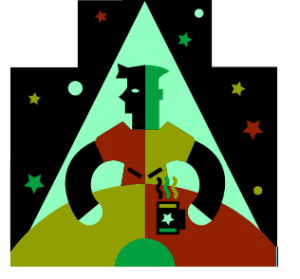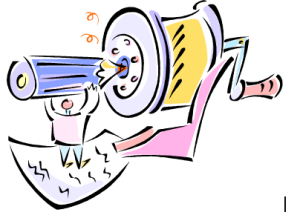Writing Strategies: Breaking through writer’s block, keeping your butt in the writing chair, and rewiring your brain
The Kill Zone is a goldmine of advice and insight on all aspects of writing and publishing, from how to write and ways to publish, to creating characters, embracing story structure, and much more.
Getting to the keyboard to write, and once there, continuing to write is a challenge for many of us, especially with the internet ready to provide endless distractions. Today’s Words of Wisdom shares three excerpts from the KZB archives that provide ideas and strategies to help get past writer’s block and keeping motivated. You can read the full post for each excerpt via the date links. It’s also an entirely unintentional, serendipitous follow-on to James Scott Bell’s Reader Friday post yesterday entitled “Setting Yourself on Fire.”
So, the table has been set for today’s discussion. Feel free to comment and engage with other readers on any, or all, of these topics.

I was feeling uninspired in my writing (which probably explains why I was surfing the Internet and reading about placebo studies). So I wondered: If a placebo can cure cranky bowels, could it help me break through a minor case of writer’s block?
I decided to run my own unscientific study. I didn’t have any sugar pills on hand, so I reached for the next best thing: my daughter’s jelly beans. I figured that labeling and ritual had to be part of the reason why placebos work, so I poured the jb’s into an empty prescription container. (And I have to report that jelly beans look extremely potent when they’re staring up at you from a bottle of blood thinner medication.) Then I put a nice label on it marked “Creativity.”
As part of my morning ritual I started taking two “creativity pills” with my coffee. As I solemnly popped the beans, I paused to meditate for a few moments about my writing goals for the day.
And by God, it worked. I blasted right through that writer’s block. I wrote four pages that day, and haven’t looked back since.
The only thing is, now I’m afraid to stop taking the beans. I think I’m hooked. For my next batch I’m thinking of getting those special-order M&Ms–the ones you can order with little messages written on them. I’ll get them labeled with something like, “Writing is rewriting,” or whatever fits.
What about you? Do you have any silly rituals that help you get your creativity engine going?
–Joe Moore, January 11, 2011
I like to reexamine what tips I would give to aspiring authors, or even experienced authors, when I get a chance to speak to a group. Invariably the question comes up on advice and I’ve noticed that what helps me now is different than what I might have found useful when I started. Below are 8 tips I still find useful. Hope you do too, but please share your ideas. I’d love to hear from you.
1.) Plunge In & Give Yourself Permission to Write Badly – Too many aspiring authors are daunted by the “I have to write perfectly” syndrome. If they do venture words onto a blank page, they don’t want to show anyone, for fear of being criticized. They are also afraid of letting anyone know they want to write. I joined writers organizations, took workshops, and read “how to” articles on different facets of the craft, but I also started in on a story.
2.) Write What You Are Passionate About – When I first started to write, I researched what was selling and found that to be romance. Romance still is a dominant force in the industry, but when I truly found my voice and my confidence came when I wrote what I loved to read, which was crime fiction and suspense. Look at what is on your reading shelves and start there.
3.) Finish What You Start – Too many people give up halfway through and run out of gas and plot. Finish what you start. You will learn more from your mistakes and may even learn what it takes to get out of a dead end.
4.) Develop a Routine & Establish Discipline – Set up a routine for when you can write and set reasonable goals for your daily word count. I track my word counts on a spreadsheet. It helps me realize that I’m making progress on my overall project completion. Motivational speaker, Zig Ziglar, said that he wrote his non-fiction books doing it a page a day. Any progress is progress. It could also help you to stay offline and focused on your writing until you get your word count in. Don’t let emails and other distractions get you off track.
–Jordan Dane, August 7, 2014
Rewiring the brain
In an article published in WD in 2012, Mike Bechtle argued that mere willpower is not the most effective solution for breaking through writer’s block. He suggests that we rewire our brains to get back into the “flow”.
Here were my major takeaways from Bechtle’s article:
- Write first thing in the morning, when alertness and energy levels are typically at their highest. (My note: If you can’t write first thing in the morning, try to write at the same time of day every day. Your brain will “learn” to kick into gear at its regular writing time)
- Fuel your brain with a nourishing breakfast (Think eggs and fruit, not an apple fritter)
- Limit distractions (Don’t check email or messages before writing, and don’t read a newspaper, turn on the TV, or listen to radio, either)
- Keep writing sessions short (The brain can focus intensely for only short periods of time, according to Bechtle)
- Apply glue to butt (Stay seated while writing, that is!)
- Don’t set your expectations too high
Other strategies
In my first foray as a fiction writer back in the 90’s, I was a contract writer for the Nancy Drew series. The schedule for those books gave me little leeway for writer’s block. As soon as the chapter outline was approved, writers were given six weeks to complete the novel. Six weeks! I had to write those stories so fast, I felt as if I was hurling words at the word processor. Every project was a race to the finish line. “Writer’s block” was a foreign concept.
Then my editor left, and the publishing landscape changed. I stopped writing NDs and began to vaguely contemplate writing something on my own. Inertia quickly set in. Months became years, and I hadn’t written anything new.
15 minutes a day, that’s all we ask
I happened to read an article by Kate White, who is an author and former editor of Cosmopolitan Magazine. Her advice to getting started? Write 15 minutes per day, first thing in the morning. No. Matter. What.
To act on Kate’s suggestion, I had to set my alarm for five a.m. instead of six. That extra hour gave me enough time to down a cup of coffee and generate 15 minutes of quality writing time, before I headed off to my day job.
White’s advice worked for me. Fifteen minutes of writing daily eventually became an hour. Soon I was producing a minimum quota of a page a day. (Yes, I know: a single page a day isn’t impressive as a quota. See the last bullet point of the previous list about lowering expectations.) A few months later, I had completed the first draft of my new novel.
Kathryn Lilley, June 16, 2015
***
Now it is your turn.
- Do you have tips for breaking through a minor writer’s block?
- How do you keep yourself writing?
- Do you have a routine you use, or a ritual?
- Any advice on keeping your keister in the writing chair?






